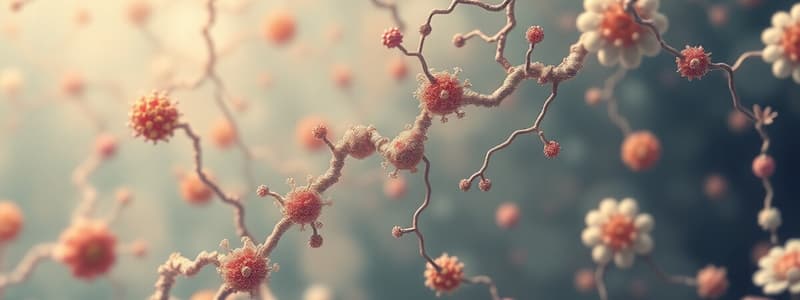Podcast
Questions and Answers
What is the primary genetic material of most organisms?
What is the primary genetic material of most organisms?
- DNA (correct)
- Proteins
- RNA
- Lipids
What are the two main stages of protein synthesis?
What are the two main stages of protein synthesis?
- Translation and Replication
- Transcription and Amplification
- Transcription and Translation (correct)
- Replication and Transcription
Which of the following molecules plays a key role in the translation stage of protein synthesis?
Which of the following molecules plays a key role in the translation stage of protein synthesis?
- DNA
- mRNA
- tRNA
- Ribosomes (correct)
Which of the following best describes the role of biochemistry in health care?
Which of the following best describes the role of biochemistry in health care?
What can genetic mutations potentially affect?
What can genetic mutations potentially affect?
What is the primary role of carbohydrates in living organisms?
What is the primary role of carbohydrates in living organisms?
Which biomolecule is primarily involved in forming cell membranes?
Which biomolecule is primarily involved in forming cell membranes?
Which process is responsible for breaking down glucose to produce ATP?
Which process is responsible for breaking down glucose to produce ATP?
What are enzymes primarily responsible for in biochemical reactions?
What are enzymes primarily responsible for in biochemical reactions?
What are proteins constructed from?
What are proteins constructed from?
What are the two main types of metabolism?
What are the two main types of metabolism?
Which component of nucleic acids is not found in proteins?
Which component of nucleic acids is not found in proteins?
How can enzyme activity be regulated?
How can enzyme activity be regulated?
Flashcards
What is Biochemistry?
What is Biochemistry?
The study of chemical processes occurring in living organisms.
What are Biomolecules?
What are Biomolecules?
Molecules essential for structure, function, and energy in living organisms.
What are Carbohydrates?
What are Carbohydrates?
Sugars and starches, providing energy and structural support.
What are Lipids?
What are Lipids?
Signup and view all the flashcards
What are Proteins?
What are Proteins?
Signup and view all the flashcards
What are Nucleic Acids?
What are Nucleic Acids?
Signup and view all the flashcards
What is Cellular Respiration?
What is Cellular Respiration?
Signup and view all the flashcards
What is Metabolism?
What is Metabolism?
Signup and view all the flashcards
What is DNA?
What is DNA?
Signup and view all the flashcards
What is DNA replication?
What is DNA replication?
Signup and view all the flashcards
What is transcription?
What is transcription?
Signup and view all the flashcards
What is translation?
What is translation?
Signup and view all the flashcards
What are genetic mutations?
What are genetic mutations?
Signup and view all the flashcards
Study Notes
Introduction to Biochemistry
- Biochemistry is the study of chemical processes within and relating to living organisms.
- It encompasses a wide range of topics, from the structure and function of biomolecules to the intricate metabolic pathways supporting life.
- Biochemistry is a highly interdisciplinary field, drawing on principles from biology, chemistry, physics, and even computer science.
- It plays a critical role in understanding health, disease, and developing new therapies.
Key Biomolecules
- Carbohydrates: Provide energy, structural support, and are involved in cellular recognition. Composed of carbon, hydrogen, and oxygen. Simple sugars (monosaccharides) like glucose and fructose form complex carbohydrates like starch and glycogen.
- Lipids: Fats, oils, and waxes. Essential for energy storage, insulation, and forming cell membranes. Examples include triglycerides, phospholipids, and steroids. Lipids are primarily composed of carbon and hydrogen.
- Proteins: Crucial for numerous cellular functions, acting as enzymes, structural components, hormones, and transporters. Constructed from amino acids linked by peptide bonds. Their complex three-dimensional structure is essential for function.
- Nucleic Acids: DNA and RNA. Carry genetic information, direct protein synthesis, and are vital for heredity and cellular function. Composed of nucleotides, each consisting of a sugar, a phosphate group, and a nitrogenous base.
Cellular Respiration
- A metabolic pathway that breaks down glucose to produce ATP, the cell's primary energy currency.
- Major stages include glycolysis, the Krebs cycle, and the electron transport chain.
- This process releases energy stored in the chemical bonds of glucose.
Metabolism
- The sum of all biochemical reactions occurring within a cell or organism.
- Includes anabolism (building molecules) and catabolism (breaking down molecules).
- Essential for maintaining homeostasis and supporting life processes.
- Regulating metabolic pathways is crucial for cellular function.
Enzymes
- Biological catalysts, typically proteins, that accelerate biochemical reactions.
- Enzymes lower the activation energy needed for reactions to proceed.
- Enzyme activity is affected by factors like temperature, pH, and substrate concentration. Specific enzymes often act on specific substrates.
- Many pharmaceutical therapies target enzymes to treat diseases.
DNA Structure and Function
- Deoxyribonucleic acid (DNA) is the primary genetic material of most organisms.
- Composed of two strands forming a double helix.
- Nucleotides with deoxyribose sugar, phosphate groups, and nitrogenous bases (adenine, thymine, guanine, and cytosine) constitute the structure. Base pairing rules dictate how the strands are bound.
- DNA replication, transcription, and translation are crucial for genetic information transfer.
Protein Synthesis
- The process of constructing proteins from amino acids by decoding genetic information in DNA.
- Involves two main stages: transcription (producing RNA from DNA) and translation (producing proteins from RNA).
- Ribosomes play a key role in translation.
- Genetic mutations can affect protein synthesis and have consequences for organismal health.
Significance of Biochemistry
- Understanding the molecular mechanisms of diseases can lead to effective treatments.
- Biochemistry plays a vital role in forensic science (e.g., DNA analysis).
- Food science, agriculture, and industrial processes are all influenced by biochemical principles.
- Research into biofuels, biopharmaceuticals, and other biotechnological applications relies heavily on biochemistry.
Studying That Suits You
Use AI to generate personalized quizzes and flashcards to suit your learning preferences.



